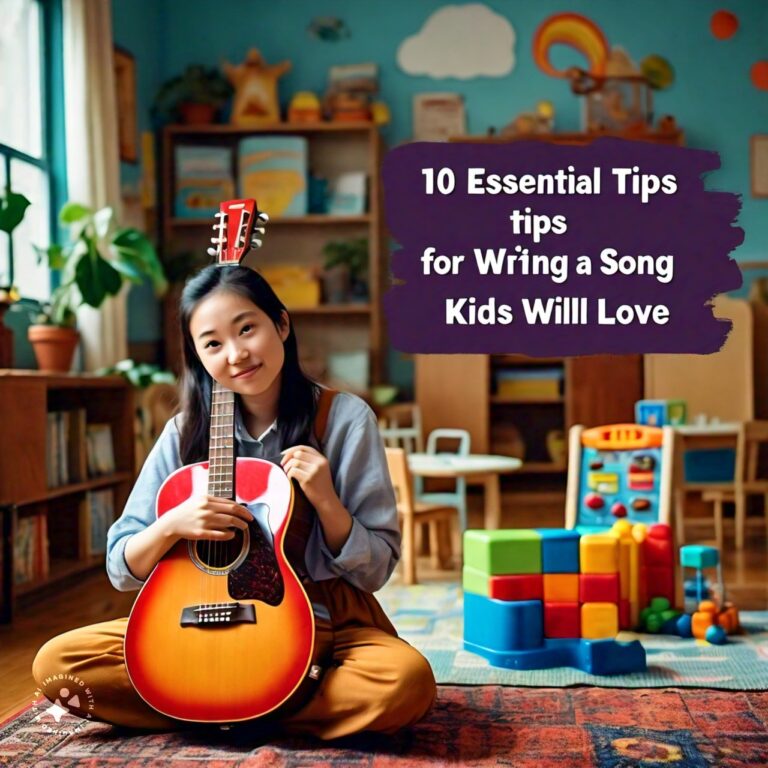Here in this blog post, We are going to give you 10 Essential Tips on How To Write a Song For Kids, We will advice you to read this article to the, you will surely learn many things including how to structure your song in a way kids will love etc.
Whether you’re a seasoned songwriter looking to expand your repertoire or a curious beginner with a twinkle in your eye, this guide equips you with the essential tools to write songs that resonate with young audiences. We’ll explore the “why” and “how” of creating catchy tunes that spark joy, inspire movement, and leave a lasting impression on little listeners.
If you’re a songwriter looking to write songs for kids, you know how challenging it can be. That’s why I’ve put together this step-by-step guide to help you write a song that kids will love.
Tip 1: Choose a Theme or Topic
Tip 2: Sing About Familiar Topics (Animals, Everyday Activities, Imagination)
Tap into a child’s world with relatable themes. Popular topics include:
- Animals: From farmyard friends to jungle adventures, songs about creatures great and small are always a hit.
- Everyday Activities: Brushing teeth, getting dressed, or playing outside – these everyday routines can be transformed into catchy tunes.
- Imagination: Spark creativity with songs about superheroes, magical lands, or talking animals.
Tip 3: Keep it Simple and Catchy (Melody, Lyrics, and Rhythm)
Complexity is great for adult audiences, but for kids, simplicity is key.
- Melody: Focus on clear, memorable melodies that are easy to sing along to. Think of short phrases and repetition.
- Lyrics: Keep your language simple and direct. Use short words, strong verbs, and rhyme schemes (think AABB or ABCB).
- Rhythm: Opt for steady, driving rhythms that encourage movement. Explore using basic drum patterns or handclaps.

“Friends, friends, they’re so dear
We laugh and play and wipe away our tears
We stick together through and through
That’s what friends are made of, me and you”
Tip 4: Make It Fun and Interactive
“Clap your hands, stomp your feet
We’re going on an adventure, can’t you see?
We’ll jump and run and dance and play
On our adventure, every single day”
Get kids engaged by incorporating interactive elements.
- Singing Along: Encourage participation with simple choruses that kids can easily learn and sing along to.
- Call and Response: Divide your song into sections where kids can respond with a specific phrase or sound effect.
Tips 5: Use Age-Appropriate Language
Tip 6: Keep It Short and Sweet
Tip 7: Repetition
Repetition is a powerful tool in children’s music. Use it to solidify melodies, lyrics, and keyphrases in your mind. A strong chorus with a catchy hook is the heart of any children’s song. Repeat it often throughout the song to create a sense of familiarity and ensure it gets stuck in their heads (in a good way!).
Tip 8: Positive and Uplifting Messages (Fun, Friendship, Kindness)
The messages we convey in our songs for children matter.
- Focus on positive themes: Fun, friendship, kindness, and perseverance are all great topics to explore.
- Spread joy and encouragement: Use uplifting lyrics that motivate and inspire young listeners.
- Promote positive social values: Songs can be a powerful tool to teach children about sharing, empathy, and respect for others.
Tip 9: Get Feedback from Kids (Test Runs with Children)
There’s no better way to gauge your song’s success than to get feedback from the target audience itself!
- Play your song for children: Test your song on a group of kids and observe their reactions. See what parts resonate with them and what might need tweaking.
- Open to constructive criticism: Don’t be afraid of constructive criticism. Use the feedback to refine your song and make it even more engaging.
Tips 10: Record and Share
Why Write Songs for Kids? (Benefits and Importance)
Benefits:
-
Language Development: Songs can help kids develop their vocabulary, syntax, and pronunciation skills.
-
Memory and Recall: Catchy melodies and repetitive lyrics can improve memory and recall abilities.
-
Creativity and Imagination: Songs can inspire creativity and imagination in kids, encouraging them to think outside the box.
-
Emotional Intelligence: Songs can help kids understand and manage their emotions, developing empathy and self-awareness.
-
Social Skills: Singing songs with others can foster social skills like teamwork, communication, and cooperation.
-
Cultural Enrichment: Songs can introduce kids to different cultures, traditions, and historical events, broadening their understanding of the world.
-
Academic Skills: Songs can support learning in various subjects, such as math, science, and literacy.
-
Confidence and Self-Expression: Singing can help kids build confidence and express themselves in a fun and creative way.
-
Bonding and Connection: Singing with family, friends, or teachers can create strong bonds and memories.
-
Fun and Enjoyment: Songs can bring joy and happiness to kids, making learning and development a delightful experience!
Importance:
-
Early Childhood Development: Songs can play a crucial role in early childhood development, laying the foundation for future learning and growth.
-
Brain Development: Music and songs can stimulate brain development, particularly in areas responsible for language, math, and spatial-temporal skills.
-
Learning Through Play: Songs can make learning fun and engaging, promoting a love for learning that lasts a lifetime.
-
Building Character: Songs can teach valuable lessons and promote positive values like kindness, respect, and perseverance.
-
Creating Traditions: Songs can become a part of family traditions and cultural heritage, passing down values and memories to future generations.
Summary
-
Keep it simple: Use simple language and melodies that kids can follow.
-
Use repetition: Repeat catchy phrases or melodies to make the song more memorable.
-
Make it visual: Add actions or gestures to help kids remember the song.
-
Encourage participation: Invite kids to join in on the singing and songwriting process.
-
Use kid-friendly themes: Write about topics that kids are interested in, such as animals, games, or adventures.
-
Experiment with instruments: Introduce kids to different instruments and sounds to add depth to the song.
-
Keep it short: Keep the song concise and attention-grabbing for young minds.
-
Have fun: Most importantly, have fun and be creative!
-
Collaborate with kids: Involve kids in the songwriting process to make it more engaging and meaningful.
-
Practice and perform: Practice the song with kids and perform it together to build confidence and enthusiasm.
What are some common mistakes to avoid when writing songs for kids?
Here are some common pitfalls to be aware of:
- Talking down to children: Avoid overly simplistic lyrics or condescending language.
- Ignoring the educational aspect: While entertainment is key, strive to incorporate positive messages or educational elements in your songs.
- Underestimating the power of production: A well-produced song with high-quality audio makes a big difference.
Conclusion
Writing songs for children is a rewarding experience that allows you to tap into your creativity and make a positive impact on young minds. By following these tips and letting your imagination run wild, you can craft catchy, engaging tunes that will spark joy, inspire movement, and leave a lasting impression on your little listeners.
Remember, the key is to keep it simple, relatable, and most importantly, fun! So grab your instrument, unleash your inner child, and get ready to create music that will make a difference in the lives of children everywhere.
Happy Songwriting!
Additional Resources:
- The National Association for Music Education (NAfME): https://nafme.org/
- The Society of Children’s Book Writers and Illustrators (SCBWI): https://www.scbwi.org/
Free Online Animation Tools:


